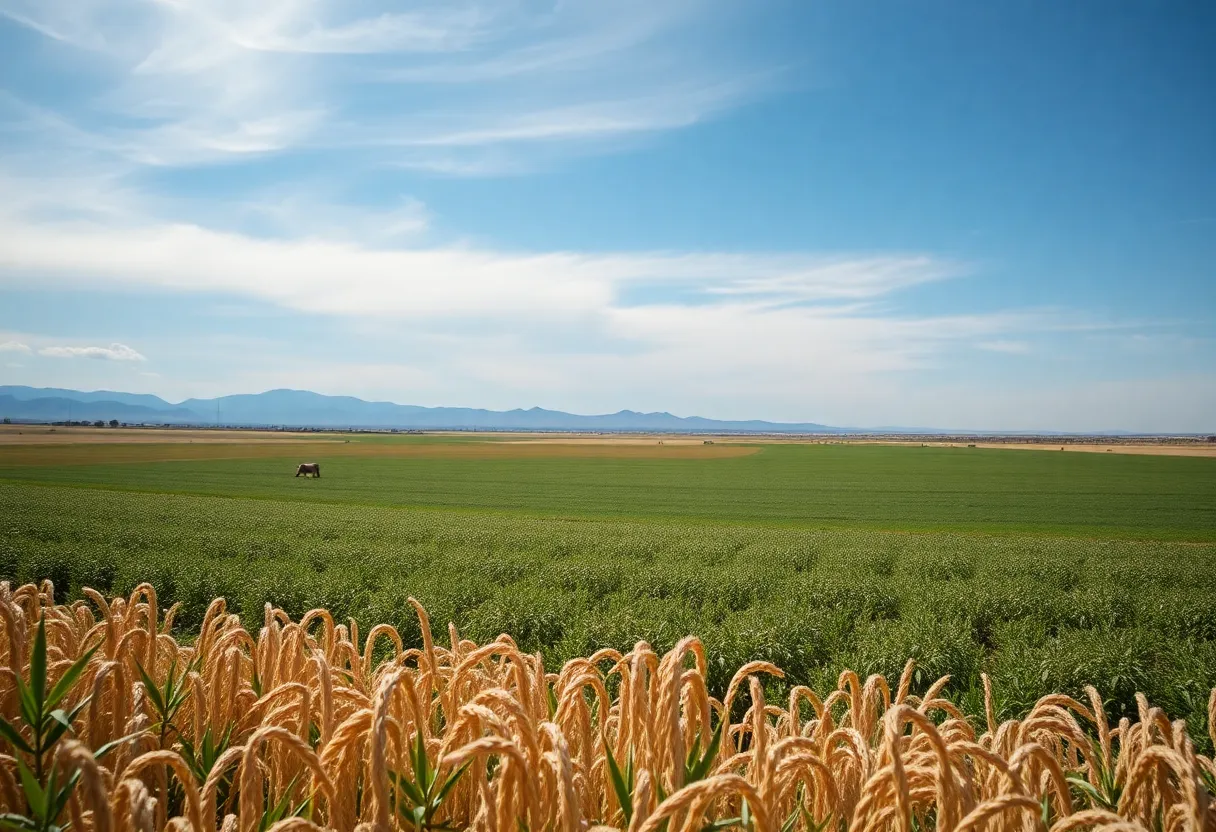News Summary
Farmers in Harquahala Valley, Arizona, are facing economic hardships due to international trade tensions and significant retaliatory tariffs imposed by China on U.S. agricultural products. This has led to a dramatic decline in exports of alfalfa hay, a critical crop for the livestock industry. Shannon Schulz, a local farmer, shares his concerns about the future, as many in the agricultural community grapple with the uncertainty of trade relations. As they await clarity on these issues, the livelihoods of many farmers hang in the balance.
Economic Challenges for Farmers in Harquahala Valley, Arizona
The beautiful Harquahala Valley in Arizona is home to extensive alfalfa hay fields, a vital component of cattle feed that keeps the U.S. beef industry flourishing. However, local farmers are currently facing significant economic strain due to ongoing international trade tensions. Alfalfa hay is not just a local product; Arizona farms export over $100 million worth of this essential crop every year to various international markets.
Farmers Feeling the Pinch
Shannon Schulz, a dedicated farmer who has been tending to the rich pastures of the Harquahala Valley for decades, is feeling the weight of this situation. His role encompasses not only harvesting this green gold but also exporting it to countries that depend on alfalfa for their dairy and livestock industries. Historically, Schulz has built strong relationships with international customers, including significant markets in the Middle East and, until recently, China.
Export Troubles
Today, Schulz and his fellow farmers are grappling with a sharp decrease in business. Warehouses that would usually be bursting with alfalfa are now largely empty, a stark reminder of the market’s downturn. The main culprit? Retaliatory tariffs imposed by China on U.S. agricultural products. These tariffs have dramatically affected trade, leading to a near-complete halt on purchases of American alfalfa by Chinese dairy farms.
Impact of Tariffs
Once a robust market, China accounted for nearly half of all Arizona’s alfalfa exports. Unfortunately, the current tariff rate is hovering around a staggering 66%, making it nearly impossible for American farmers to compete with those producing alfalfa in Africa and Europe. Due to these tariff barriers, Chinese farms have shifted their sourcing strategies away from American products, leaving many local farmers worried.
A Grim Forecast
Schulz is deeply concerned about the future as he counts down the seasons until his alfalfa is ready for harvest. With his market disappearing, he wonders if he will have any buyers left by the time he’s ready to sell. The loss of about half his business could be crippling. While many farmers are holding onto hope, Schulz’s situation highlights an unsettling reality: the fragile balance between American farmers and international markets.
Looking for Solutions
Despite the challenges he faces, Schulz had initially supported the tariffs hoping they would bring about long-term advantages for American manufacturing and export markets. However, as financial pressures mount, he finds himself in a tough position, equipped with just a few months of operational runway left before he must consider significant changes to his farming and export strategies.
The Need for Clarity
Schulz’s situation resonates with many in the agricultural community, prompting questions about the interdependencies that exist between U.S. farmers and Chinese markets. There’s an urgent need for clarity regarding future trade relations to foster better planning and stability within the agricultural sector.
Government Support and Future Prospects
During former President Trump’s administration, farmers impacted by these kinds of tariffs received financial assistance, but the specifics of support measures from the current administration remain unclear. As this challenge unfolds, it shines a spotlight on broader issues faced by Arizona agriculture amidst shifting trade policies and international relations.
Conclusion
The farmers of Harquahala Valley are eager for a resolution that will allow them to reclaim their place in the international market. As they wait for clarity on future trade practices, they hope for an end to a tumultuous chapter that has left many worrying about their livelihoods.
Deeper Dive: News & Info About This Topic
- ABC15 News
- Wikipedia: Alfalfa
- Hoodline
- Google Search: Chinese tariffs impact on US farmers
- AP News
- AZ Central

Author: STAFF HERE PHOENIX WRITER
The PHOENIX STAFF WRITER represents the experienced team at HEREPhoenix.com, your go-to source for actionable local news and information in Phoenix, Maricopa County, and beyond. Specializing in "news you can use," we cover essential topics like product reviews for personal and business needs, local business directories, politics, real estate trends, neighborhood insights, and state news affecting the area—with deep expertise drawn from years of dedicated reporting and strong community input, including local press releases and business updates. We deliver top reporting on high-value events such as the Waste Management Phoenix Open, Cactus League Spring Training, and Arizona State Fair. Our coverage extends to key organizations like the Greater Phoenix Chamber of Commerce and Visit Phoenix, plus leading businesses in technology and healthcare that power the local economy such as Intel and Banner Health. As part of the broader HERE network, including HERETucson.com, we provide comprehensive, credible insights into Arizona's dynamic landscape.





